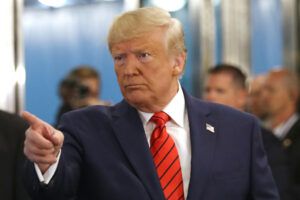Weird How All Trump's Old Lawyers Are Washing Their Hair This Week
Probably a coincidence, right?

(Photo by Spencer Platt/Getty Images)
Since August 8, when the FBI executed a search warrant on Donald Trump’s private club to retrieve documents belonging to the US government, there’s been a steady stream of embarrassing revelations about the former president’s handling of classified documents. In the past 48 hours, we’ve seen: Team Trump leak a letter confirming that the National Archives negotiated for a year to retrieve over 700 pages of classified documents he was hanging onto; a preposterous motion-shaped object hurled in the direction of the federal docket; and a sharp rebuke from US District Judge Aileen Cannon, a Trump-appointee, demanding that Trump’s lawyers go back and shape that object into an actual motion and stop wasting her time.
Yesterday, the Washington Post posted a detailed ticktock of the “tortured standoff among Trump; some of his own advisers, who urged the return of documents; and the bureaucrats charged by the law with maintaining and protecting presidential records.” And it is goddamn delightful!

Generative AI at Work: Boosting e-Discovery Efficiency for Corporate Legal Teams
What is not goddamn delightful, however, is being Trump’s lawyer. Which is why so many have graciously declined the offer, particularly those who have previously enjoyed the honor and know exactly what it entails.
As detailed in the letter inexplicably published by Trump’s buddy Jonathon Solomon, who is still insisting that it’s somehow a big GOTCHA that President Biden deferred to the Justice Department and didn’t swan in to rescue his predecessor, the Archives and later the DOJ engaged in protracted negotiations for the return of the government documents Trump had stashed in a storage locker at Mar-a-Lago.
Having recovered classified documents up to and including Sensitive Compartmented Information and Special Access Program materials, the Archives then referred the matter to the Justice Department. But because the Presidential Records Act provides a 30-day window for the prior president to object to disclosures of sealed presidential records, the Archivist needed to get someone to go through the documents for Trump. First they hit up the lawyers who shoveled Trump’s shit in the White House.
On April 12, an Archives official emailed [Deputy White House Counsel Pat] Philbin and John Eisenberg, another former deputy White House counsel, to tell them the Justice Department, via the Biden White House, had made the request. The email offered the lawyers the opportunity to view the documents as well, but said the documents were too sensitive to be removed from the agency’s secure facility.
A Trump official with proper national security clearance would have to travel to the Archives facility in Washington to read them.
Both Philbin and Eisenberg had the clearances that would allow them to make the trip. Trump allies tried to get Philbin, and then Eisenberg, to agree to do so, a person familiar with the record dispute said. But neither man had been involved with the original packing of the documents. Nor did they know what had gone into the boxes. Eager not to become more involved in the investigation, they begged off, this person said. The FBI sought to interview Philbin about Trump’s handling of classified material, making him a potential witness in the probe.
Sponsored

Generative AI at Work: Boosting e-Discovery Efficiency for Corporate Legal Teams

Unveiling Hidden Deal Insights: GenAI For Powerful Negotiation And Exceptional Client Service

AI Presents Both Opportunities And Risks For Lawyers. Are You Prepared?

A New AI-Powered Practice Management Platform With Flexible Deployment Options
Let us pause to appreciate the delicious irony of Philbin and Eisenberg, who worked diligently to thwart congressional oversight, hid the whistleblower report of Trump’s attempt to extort the President of Ukraine for dirt on Joe Biden, and then defended him in the first impeachment, refusing to sully themselves by reviewing documents for the National Archives. Wouldn’t want to get your hands dirty, boys!
After getting brushed off by the Wonder Twins, the Archives turned to Evan Corcoran, Trump’s current lawyer, who also has the distinction of representing Steve Bannon.
The Post quotes a source describing his hiring thusly:
“There was no vetting done by the president,” the person said of Corcoran, adding that other lawyers had declined the job already. “The president got on the call, asked him his name, and if he wanted to do this work, and he said yes.”
Perfect, no notes.
Sponsored

A New AI-Powered Practice Management Platform With Flexible Deployment Options

Happy Lawyers, Better Results The Key To Thriving In Tough Times
As confirmed by that letter which John Solomon helpfully published, by May nobody on Team Trump had bothered to review the documents to lodge particularized objections. Instead, Corcoran demanded more time to find someone with the appropriate clearance who was willing to do it. When the Archivist refused to extend the deadline again, Corcoran declared Trump was making a “protective assertion of privilege” over the whole kit and caboodle. Which, the Archivist replied, was not a thing and also not the former president’s call to make.
In June, Corcoran and Trump’s OAN attorney Christina Bobb “together provided the Justice Department with a written assurance about Trump having returned classified materials,” according to the Post, although the New York Times says Corcoran drafted it and had the much younger Bobb sign it. In any event, those assurances were disproved on August 8, when the FBI removed several more boxes containing classified documents.
Trump’s spokesman Taylor Budowich promised the Post that Trump would “defeat this massive abuse of government just like every one before by exposing the lies and championing the truth.”
But judging by the opening salvo in Judge Cannon’s courtroom, it seems like he’ll need some better foot soldiers.
FBI’s Mar-a-Lago search followed months of resistance, delay by Trump [WaPo]
Trump v. United States [Docket via Court Listener]
Liz Dye lives in Baltimore where she writes about law and politics.







